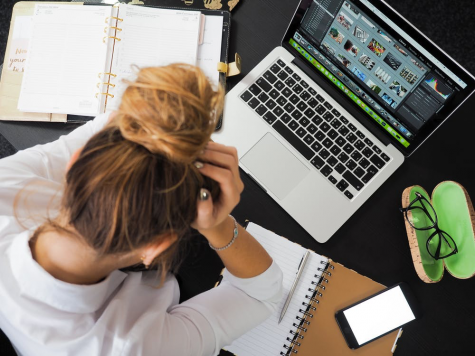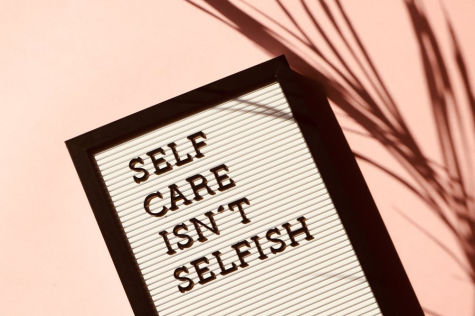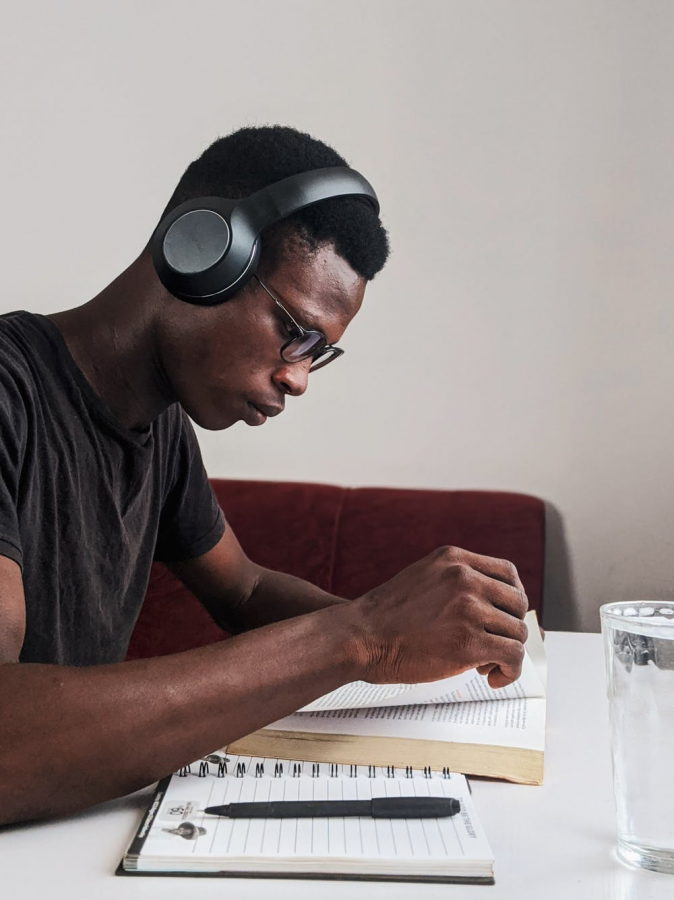Remote Learning: A Mental Health Crisis
March 30, 2021
In a bizarre time very few have experienced, we as a society are lacking face-to-face interaction, and it is affecting us tremendously. In a time as traumatic as now, mental health is being paid close attention to more than ever before.
It seems as if the pandemic has turned the world upside-down. COVID-19 has introduced society to different ways of doing everyday things safely, including working, going to school, the grocery store, and more. However, one of the biggest challenges for many young adults has been learning online.
Many students have not experienced what it is like to learn remotely. Sitting at home in bed on Zoom meetings is definitely not the ideal high school experience. However, the switch from traditional, in-person class to online learning became an unfortunate reality for Gen Z as the COVID-19 pandemic struck quickly.
Poor mental health affects individuals in all aspects of life. During the pandemic, a majority of students’ mental health has worsened due to increased computer time and lack of social interaction, which is proven to be linked to anxiety and depression. As a naturally social species, we are not meant to be isolated for such long periods of time.
“The mental health of my students is extremely important to me. I can’t imagine what they are going through right now!” Mr. Lovett, Pentucket’s Anatomy and Physiology teacher, explains.
Mr. Lovett empathizes with his students by saying, “To help accommodate them so they don’t feel overwhelmed, I try to be very lenient with assignment due dates.”
Although most teachers do their best to make remote learning as interactive and fun as possible, many students have fallen short of their full potential in assignments. Not having the vital face-to-face interaction is detrimental to a student’s academic success.
Pentucket Sophomore Kaiden Currie adds a piece of advice to teachers, saying, “Remember that we, as students, have never been in a situation like this. It is near impossible to learn and produce work at the same level as previous years due to COVID-19. So it is extremely unfair to students for you to compare this year with previous ones, in regards to our work and levels of motivation.”
According to a survey conducted among 62 Pentucket High School students, roughly 40 percent say, on a scale from 1-10, online learning has been an eight for levels of stress. Furthermore, around 60 percent of students say they balance school, friends and family, and extracurricular activities worse than any previous years.
“It is hard for students to be able to find a proper balance between their lives and personal relationships and school, as it feels most time is consumed by school and any time not working is a waste,” Pentucket Sophomore Owen Campell says. “Giving students the time they need to do the activities they enjoy can be instrumental in making online learning the productive and useful tool that it can be.”

Stress has a way of consuming our lives. It is a normal response to anything uncertain in life. During this school year, stress is the main component that is negatively impacting students’ mental health, with a big factor being the uncertainty of what the future holds.
According to The Centre for Addiction and Mental Health, “When stress becomes overwhelming and prolonged, the risks for mental health problems and medical problems increase. Long-term stress increases the risk of mental health problems such as anxiety and depression, substance use problems, sleep problems, pain and bodily complaints such as muscle tension.”
Not having an established routine factors into the fact many are struggling with lack of motivation and falling behind in school. A routine allows us to take on everyday tasks in a familiar environment easily. With no routine present, students feel confused, and therefore much more stressed and counterproductive.
Nonetheless, in every negative situation life brings, it is crucial to look at it in a positive light.

Pentucket Sophomore Riley Bucco expresses, “The pandemic has helped students and educators pause and put mental health as the number one priority. For the most part we are not getting ‘homework,’ which has reduced my stress drastically. After a long day at school and then for most, a sport, doing homework causes kids to go to bed at an unhealthy hour…thanks to the pandemic, after [the] normal school hours, schoolwork is done for the day.”
Through the ups and downs of this ongoing pandemic, education and means of learning has no doubt changed tremendously. Although COVID-19 has brought lots of negatives, it has also brought about changes that will better our society in the future. As people are now becoming vaccinated, and we adjust to a “new normal,” all we can do is keep a positive attitude towards the future and make sure to prioritize our mental health.
Self-care is health care!


Aiden Wilcox • Apr 13, 2021 at 10:52 am
It is good to read a piece that articulates the necessity among students to prioritize their mental health. I believe that this issue is one too lightly considered, and one that is rampant in the modern period of education. Too many students are being forced to choose between mental health and academic success, which is something that has to stop. You highlighted some excellent points about this and brought some student voices regarding the issue into the picture. This is exactly the kind of awareness that needs to be raised in our society currently.
Libby Murphy • Apr 9, 2021 at 11:41 am
It is so nice to hear all of the different perspectives of students and know that teachers also understand the struggle for students to stay motivated throughout the pandemic. This is such a good reminder to prioritize your mental health just as much as your academic success too. Oftentimes maintaining good grades can make us forget to take a step back and evaluate how we are doing emotionally. Really insightful article!